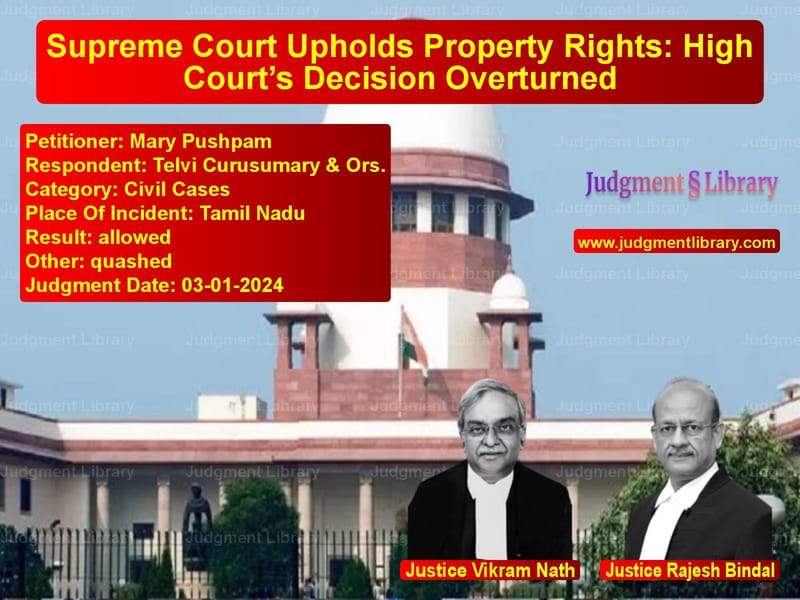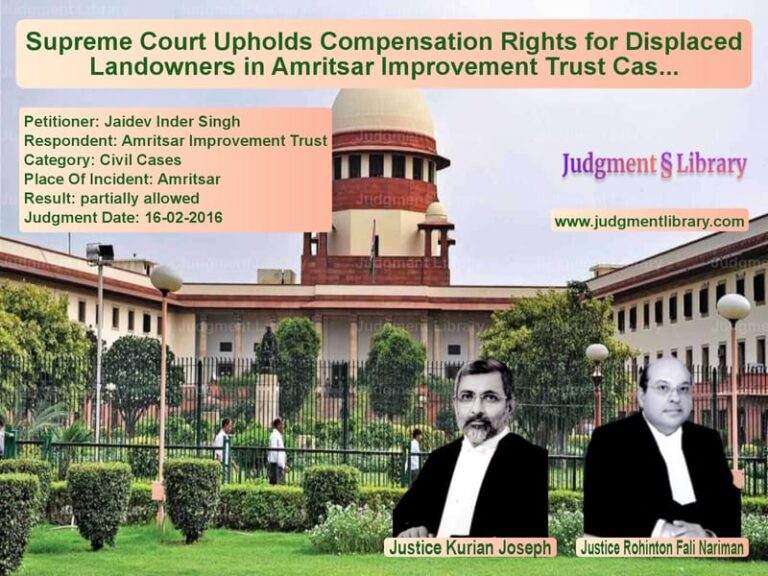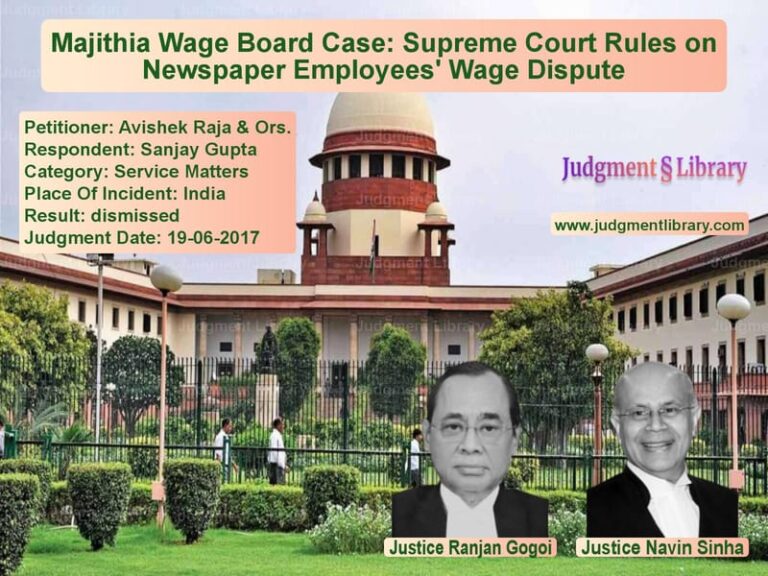Supreme Court Upholds Property Rights: High Court’s Decision Overturned
The Supreme Court of India, in its judgment dated January 3, 2024, ruled in favor of Mary Pushpam, upholding her property rights and setting aside the decision of the Madras High Court. The Court found that the High Court erred in disregarding the earlier judgment from 1990, which had established the appellant’s ownership over the disputed 8 cents of land.
Background of the Case
The case involved a long-standing property dispute between Mary Pushpam (appellant) and Telvi Curusumary and others (respondents). The respondents had originally filed a suit in 1976 for ejectment of the appellant from a piece of land measuring 8 cents. This suit was dismissed by the Trial Court, and subsequent appeals, including a Second Appeal before the Madras High Court, were also dismissed on March 30, 1990. The decision in 1990 had clearly established the appellant’s possession and ownership over the entire disputed land.
Read also: https://judgmentlibrary.com/supreme-court-overturns-high-court-decision-in-land-ownership-dispute/
Despite this, the respondents later attempted to interfere with the appellant’s possession, prompting her to file a fresh suit in 1995 for declaration of title, possession, and permanent injunction. The Trial Court, in its decision dated June 30, 1997, ruled in favor of the appellant but only in relation to the constructed portion of the land, excluding the full 8 cents.
The appellant challenged this limited relief, and the First Appellate Court modified the decision, granting her ownership over the entire 8 cents of land. However, the respondents filed a Second Appeal, and the Madras High Court, in its judgment dated July 21, 2009, reversed the First Appellate Court’s decision and restored the Trial Court’s limited ruling. This led to the present appeal before the Supreme Court.
Key Legal Issues
- Whether the 1990 High Court judgment conclusively established the appellant’s ownership over the entire 8 cents of land.
- Whether the High Court in 2009 violated judicial discipline by deviating from the 1990 ruling.
- Whether the respondents had any legal basis to claim possession over the land after losing their earlier ejectment suit.
Petitioner’s Arguments
The appellant argued that:
- The 1990 judgment had settled the dispute in her favor, recognizing her ownership over the entire 8 cents of land.
- The respondents’ claim was barred by res judicata since they had lost the earlier case and did not challenge the ruling further.
- The High Court, in its 2009 decision, acted in disregard of judicial discipline by interpreting the 1990 ruling differently without referring the matter to a larger bench.
- The First Appellate Court correctly applied the principle of judicial discipline in its 2003 decision, recognizing that the 1990 judgment was binding.
Respondent’s Arguments
The respondents countered that:
- The 1990 judgment only pertained to the constructed portion of the land and did not grant the appellant rights over the full 8 cents.
- They had purchased the land in 1974 through a registered sale deed and remained its legal owners.
- The appellant’s claim of adverse possession was not legally tenable.
- The Trial Court’s 1997 decision, which limited the appellant’s ownership to the constructed area, was correct.
Supreme Court’s Observations
The Supreme Court analyzed the 1990 High Court judgment and found that it explicitly referred to the entire 8 cents of land as being in dispute. The Court observed:
“The judgment of the High Court in 1990, at multiple places, recorded that the suit property comprised 8 cents of land. There is no ambiguity in the language used, and the findings were clear.”
The Court further stated:
“Once a higher court has decided an issue, a coordinate bench of the same strength cannot disregard that ruling. Any deviation must be referred to a larger bench.”
Doctrine of Judicial Discipline and Precedents
The Court reaffirmed the principle that decisions of higher courts are binding on lower courts and coordinate benches. Citing previous rulings, the Court stated:
“Judicial discipline envisages that a coordinate bench follows the decision of an earlier coordinate bench. If a coordinate bench does not agree, the matter should be referred to a larger bench.”
Applying this principle, the Court found that the High Court’s 2009 ruling was legally unsound, as it had effectively overturned the 1990 decision without justification.
Final Judgment
The Supreme Court allowed the appeal and restored the 2003 First Appellate Court decision, granting the appellant full ownership of the 8 cents of land. The Court held:
“The impugned judgment and order of the High Court is set aside, and that of the First Appellate Court dated 13.10.2003 is restored.”
The Court also clarified that the respondents had no further claim over the land and issued a permanent injunction against their interference.
Key Takeaways from the Judgment
- Once a judgment attains finality, subsequent courts cannot reinterpret it contrary to its original intent.
- Lower courts must adhere to rulings of higher courts under the doctrine of judicial discipline.
- Res judicata prevents relitigation of issues already settled between the same parties.
- Possession and title claims must be based on conclusive legal findings, not reinterpreted in later proceedings.
This ruling reaffirms the importance of consistency and discipline in judicial decision-making and protects the finality of court rulings.
Petitioner Name: Mary Pushpam.Respondent Name: Telvi Curusumary & Ors..Judgment By: Justice Vikram Nath, Justice Rajesh Bindal.Place Of Incident: Tamil Nadu.Judgment Date: 03-01-2024.
Don’t miss out on the full details! Download the complete judgment in PDF format below and gain valuable insights instantly!
Download Judgment: mary-pushpam-vs-telvi-curusumary-&-o-supreme-court-of-india-judgment-dated-03-01-2024.pdf
Directly Download Judgment: Directly download this Judgment
See all petitions in Property Disputes
See all petitions in Specific Performance
See all petitions in Judgment by Vikram Nath
See all petitions in Judgment by Rajesh Bindal
See all petitions in allowed
See all petitions in Quashed
See all petitions in supreme court of India judgments January 2024
See all petitions in 2024 judgments
See all posts in Civil Cases Category
See all allowed petitions in Civil Cases Category
See all Dismissed petitions in Civil Cases Category
See all partially allowed petitions in Civil Cases Category







